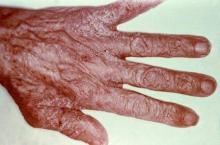Mass drug administration, particularly with ivermectin, controls scabies and its burdensome complications in endemic regions of the world, according to a report published online Dec. 10 in the New England Journal of Medicine.
Scabies, a skin condition caused by a microscopic mite and transmitted by person-to-person contact, causes debilitating itching, sleep disturbance, reduced ability to concentrate and social stigmatization. In many developing countries, it is an important cause of impetigo, which in turn can lead to septicemia, glomerulonephritis, and rheumatic heart disease. Scabies is estimated to affect 100 million people worldwide every year, said Lucia Romani of the Kirby Institute, University of New South Wales (Australia), and her associates.
Even though effective treatments are available, scabies reinfestation is common. The investigators performed a comparative trial to determine whether mass drug administration, similar to that used for several other tropical diseases, would be more effective than usual care would be at controlling scabies. They randomly assigned three relatively isolated island communities in Fiji to receive three different treatment approaches during a 1-year period: topical permethrin given to all affected persons and their contacts (standard care), mass administration of topical permethrin to the entire community (permethrin group), or mass administration of oral ivermectin (ivermectin group). Treatment was administered at a single nurse-staffed health clinic in each community.
A total of 2,051 residents of all ages agreed to participate in the study, which represents more than 85% of the population. The prevalence of scabies was high at baseline: 37% of the 803 participants were given standard care, 42% of the 532 participants were given permethrin, and 32% of the 716 participants were given ivermectin. The severity of disease was similar across the three study groups.
Receipt of treatment was directly observed by clinic staff much more frequently with ivermectin (96%) than with permethrin (58%), mostly because of the different routes of administration.
The primary outcome measure – decline in the prevalence of scabies from baseline to 12 months – occurred in all three study groups, but a significantly greater reduction occurred in the ivermectin group. The relative reduction in scabies prevalence was 94% with ivermectin, 62% with permethrin, and 49% with standard care. The combined relative reduction in the two groups that had mass drug administration was 78%, Ms. Romani and her associates wrote (N Engl J Med. 2015 Dec 10;373:2305-13. doi:10.1056/NEJMoa1500987).
The prevalence of impetigo showed a similar pattern, with a relative reduction of 67% for ivermectin, 54% for permethrin, and 32% for standard care. The number of clinic visits also declined, with 10.6 fewer visits per 100 persons for ivermectin, 7.0 fewer for permethrin, and 13.7 fewer for standard care.
Scabies declined in all age groups and in both sexes. In addition to reductions in prevalence, there also were significant declines in the severity of scabies cases that did develop.
Adverse events were common, but all were mild and resolved quickly. Itching was the most frequent event and likely was caused by an inflammatory response to dead mite antigens. A total of 5.3% of the ivermectin group and 3.6% of the permethrin group reported itching, and 3.8% of the ivermectin group and 0.9% of the permethrin group reported headache.
The study findings show that mass drug administration may become an important control strategy in countries where scabies is endemic. Its effectiveness must now be studied in larger populations, with an eye toward establishing the optimal number of treatment cycles and mode of delivery, mechanisms to track efficacy and safety, and cost effectiveness. The effect that controlling scabies and impetigo exerts on downstream complications also should be assessed, they added.
The study was funded by the Australian National Health and Medical Research Council. Ms. Romani reported receiving nonfinancial support from Merck, Sharp & Dohme; her associates reported having no relevant financial disclosures. Merck, Sharp & Dohme provided the ivermectin but had no other role in the study.

